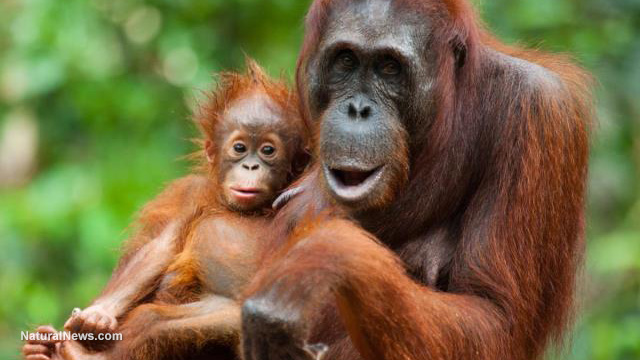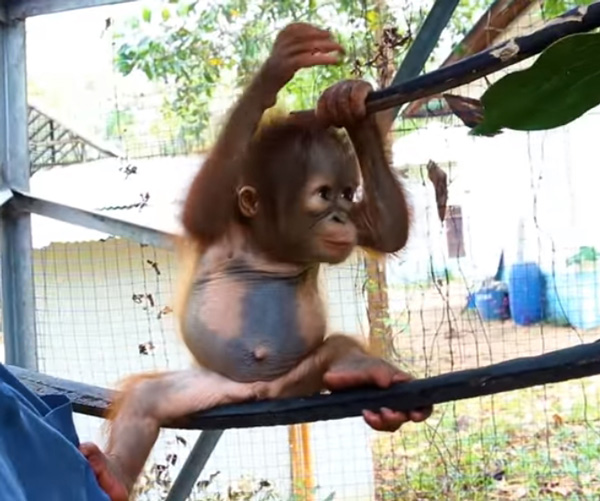Shocking: Orangutans to be extinct in just 10 years?
Friday, September 02, 2016 by: Samantha Debbie
Tags: endangered orangutans, palm oil, deforestation

(NaturalNews) Native to the island of Borneo, the Bornean orangutan is at risk of extinction due to habitat destruction. The animal, one of the human's closest cousins, was reclassified as critically endangered by the International Union for the Conservation of Nature (IUCN) in July 2016. Habitat belonging to the Bornean orangutan is being swiftly destroyed for the building of palm oil plantations.
Environmental groups say that the situation is dire, with more than a quarter, or 76 million acres, of the animal's habitat destroyed over the last few decades. Failure to take action will result in the worldwide extinction of orangutans by the year 2026, the International Animal Rescue (IAR) said in a statement.
Out-of-control fires "among peat beds" burning in many Indonesian islands coupled with deforestation have created a glum situation for the sweet animals, which are known for their childlike, playful behavior.

Orangutans are being sacrificed for the palm oil industry
"Chief executive of IAR, Alan Knight, predicts that we will see the permanent loss of several species of orangutans within the next decade unless serious efforts are made to address the fires and consumer-driven deforestation in this region," reports the Waking Times."He speculates that the fires, which are often claimed to be naturally occurring, provide the perfect cover for companies wishing to expand palm oil production and to clear vast swaths of rainforest without seeking legal approval."
Knight says that the palm oil industry capitalizes on the fires by claiming that the charred land is now purposeless, providing the perfect excuse to move in and establish operations.
Inexpensive palm oil is used in a variety of consumer products, including biodiesel fuel, beauty products such as shampoo and toothpaste, and even foodstuffs including pizza crusts, frying oil, snack foods and noodles.
Some of the largest name brands incorporating the ingredient in their products include PepsiCo, Johnson & Johnson and Colgate-Palmolive.

How YOU can help save orangutans today
Sadly, the result is that orangutans and other animals are being driven from their homes. Alex Pietrowski with the Waking Times says an estimated 20,000 orangutans could be wiped out."If the current destruction of the rainforest continues, then I have absolutely no hope that any orangutans will remain in the wild," Knight added.
Fortunately, there are many things we can do to help save the orangutans. One of the easiest ways is to donate money to the Orangutan Conservancy and their mission to protect the animals.
The organization backs projects that both rescue and rehabilitate orangutans, as well creating awareness about their risk of extinction. You can even virtually adopt an orangutan through a program for $120 per year.

Chief veterinarian tours U.S. raising awareness about saving the orangutan
In an effort to raise awareness, Karmele Llano Sanchez, chief veterinarian and program director for IAR Indonesia, is currently traveling around the United States generating funds for her work in rescuing and rehabilitating the animals.Karmele is in charge of a large team of veterinarians, primatologists, scientists, researchers and animal keepers at IAR's Orangutan Conservation Center in Ketapang, West Borneo.
The facility houses about 100 of the great apes, some of which have been kept in captivity as pets, while others were found stranded after their habit was destroyed.
Karmele is scheduled to give presentations on the animal's situation in Westport, Connecticut, on September 2nd through the 5th, and then in New York on the 6th and 7th.
To arrange an interview with her, you may contact Sophie Pollmann at (203) 919-7386 or via email at sophie@internationalanimalrescue.org.
Sources:
WakingTimes.com
InternationalAnimalRescue.org
PBS.org
Orangutan.com
Endangered orangutans at FETCH.news
Get independent news alerts on natural cures, food lab tests, cannabis medicine, science, robotics, drones, privacy and more.
Take Action: Support Natural News by linking to this article from your website
Permalink to this article:
Embed article link: (copy HTML code below):
Reprinting this article:
Non-commercial use OK, cite NaturalNews.com with clickable link.
Follow Natural News on Facebook, Twitter, Google Plus, and Pinterest
- European Court of Justice: Healthcare professionals who promoted or administered COVID-19 vaccines are CRIMINALLY LIABLE for any harm caused
- Cinnamon plays a critical role in diabetes management
- FRAUD ALERT: Details DEMOCRATS do NOT want you to know about the $40 BILLION wasted on Fed-loaded credit cards cancelled by DOGE
- Scientists unveil breakthrough method to eliminate "Forever Chemicals" from water, transforming waste into graphene
- Newly released JFK files reveal Pentagon's role in creating Lyme disease and covid in the same lab
- Postcard from 1875 highlights smallpox vaccine’s failure: Lessons for today’s COVID-19 response
- Massive egg substitution recall: Bleach contamination sparks nationwide concern
- AI-powered forecasting model proves more accurate than traditional systems at predicting the weather
- Oncologist warns of ‘terrifyingly aggressive’ cancers in children, linked to immune suppression from COVID vaccines
- Preparing for the unthinkable with William Brocius’ “How to Survive the Death of the Dollar”
- Science proves PASSION FRUIT is a powerful medicine for the GUT and the HEART
- When antibiotics are unavailable, natural ANTIMICROBIAL compounds become essential first line defenses against infection
- The NIH reckoning: Battling censorship and restoring free speech in health research
- Israel's war on Gaza's healthcare: Over 1,400 medical workers killed in attacks
- EPA reconsiders Obama's CO2 “Endangerment Finding” - could unleash American energy freedom
- Exclusive: Microscopic analysis suggests unknown biological contaminants falling from the sky
- Israeli forces execute Gaza medics, bury them in mass grave in Rafah
- Nature's cold-fighting arsenal: Immune-boosting foods and healing recipes you need now
- Newly released JFK files reveal Pentagon's role in creating Lyme disease and covid in the same lab
- Kiss Your Genetic Privacy Good-Bye! 23andMe Gets Green Light to Sell Your Intimate Genetic Details to Anyone They Want
- Oncologist warns of ‘terrifyingly aggressive’ cancers in children, linked to immune suppression from COVID vaccines
- Analysis: The coming economic collapse, a mass uprising and Trump's three secret weapons to halt the growing revolt
- European Court of Justice: Healthcare professionals who promoted or administered COVID-19 vaccines are CRIMINALLY LIABLE for any harm caused
- Dr. Suzanne Humphries makes bombshell appearance on Joe Rogan podcast, exposing vaccine industry deception back to POLIOMYELITIS
- Woman contracts WORLD'S DEADLIEST VIRUS after unknowingly being given the WRONG VACCINE
- NIH study, buried for decades, reveals that Flu Shots INCREASE elderly deaths, not prevent them
- Sugar-free deception: Artificial sweeteners hijack hunger signals, fuel obesity epidemic, study warns
- CDC finally halts $11 billion COVID funding scam as health officials admit the ‘pandemic’ was a fraud
- AI weather model outperforms traditional forecasts, boosts accuracy by 20%
- Black cumin seed oil emerges as a powerful ally against breast cancer and chronic inflammation
- Musk targets “strangely wealthy” lawmakers in DOGE probe, names Pelosi, McConnell, Schumer
- COVID-19 scandal linked to CANCER SURGE: Billionaire researcher sounds alarm
- “Independent” anti-Russia outlet MEDUZA faces COLLAPSE as US funding dries up
- The Health Ranger releases “Vaccine Zombie” song and music video, using AI-animated zombies for the music video
- DARPA: The shadowy innovator behind the world’s most advanced military technologies
- Britain’s descent into police state censorship: Parents raided for questioning their daughter’s school system online
- Newly released JFK files reveal Pentagon's role in creating Lyme disease and covid in the same lab
- California's social media censorship law struck down: A victory for free speech or a threat to online safety?
- EPA advisor admits the agency is funneling billions to climate groups ahead of Trump’s return to White House
- The Health Ranger releases “Vaccine Zombie” song and music video, using AI-animated zombies for the music video
- Dr. Mike Yeadon releases 15-minute testimony - WATCH - about genocidal intent of COVID “vaccines”
- Florida takes a stand: DeSantis proposes permanent ban on mRNA vaccine mandates
- Mike Adams releases country western hit single: Goin’ Back in Time is Comin’ Home
- Rep. Nancy Mace introduces bill to ban biological males from female facilities on federal property
- Unpacking the Lies That We’ve Been Fed – new song and music video released by Mike Adams, the Health Ranger
- “Why we influenced the 2020 elections”: Facebook files reveal the coordinated effort to bury the Hunter Biden laptop story
- House Intelligence Committee calls for the ARREST and PROSECUTION of Dr. Anthony Fauci
- Sugarcane extract superior to cholesterol-lowering drugs?
- The pandemic as a tool for INDOCTRINATION: Understanding “The Indoctrinated Brain” by Dr. Michael Nehls
- Survival 101: Effective EMF blocking techniques
- Mike Adams releases music poetry sensation: A Child of God
- Peter Rost exposes Big Pharma corruption in his book “The Whistleblower: Confessions of a Healthcare Hitman”
- Migrants are taking advantage of recent hurricanes to scam residents and loot their homes
- Michigan sheriff announces criminal investigation into 2020 election crimes, Dominion Voting Systems
- Red Cross issues warning to stop blood plasma donations from vaccinated people
- Scientists confirm: GENIUS brain function can be spontaneously unleashed in humans without any apparent cause
- EPA advisor admits the agency is funneling billions to climate groups ahead of Trump’s return to White House
- HYSSOP: What research reveals about the health benefits of this ancient holy herb
- Two containers with completed ballots fall out of truck in Florida
- Fully vaccinated about to see “tsunami” of illness and death, warns virologist
- Global leaders unite to clamp down on “misinformation” with UN-backed Cascais Declaration
- BREAKING: 2025 NDAA authorizes mandatory military draft of WOMEN across America… as Pentagon pursues global NUCLEAR war with both Russia and China at the same time
- Michael Yon warns of a ZIONIST TAKEOVER in Trump’s second administration
- Ozempic and Wegovy weight loss drugs are injectable LIZARD VENOM PEPTIDES that may unleash a devastating wave of organ failure… side effects align with symptoms of SNAKE BITES
- BOMBSHELL: DNA testing kits are a SCAM to develop ethnic-specific bioweapons
- Israeli soldiers accused of even more torture and abuse in the West Bank
- These 13 countries just signed an agreement to engineer a global FAMINE by destroying food supply
- NASA admits that climate change occurs because of changes in Earth’s solar orbit, and NOT because of SUVs and fossil fuels
- Newly released JFK files reveal Pentagon's role in creating Lyme disease and covid in the same lab
- RFK Jr. clears key hurdle: Sen. Susan Collins backs controversial HHS nominee, signaling a new era for health policy
- Sermon 30: How Jesus reveals Caesar’s FAKE CURRENCY and FALSE AUTHORITY
- Coriander seeds: Ancient medicine backed by modern science
Science News & Studies
Medicine News and Information
Food News & Studies
Health News & Studies
Herbs News & Information
Pollution News & Studies
Cancer News & Studies
Climate News & Studies
Survival News & Information
Gear News & Information
News covering technology, stocks, hackers, and more



"Big Tech and mainstream media are constantly trying to silence the independent voices that dare to bring you the truth about toxic food ingredients, dangerous medications and the failed, fraudulent science of the profit-driven medical establishment.
Email is one of the best ways to make sure you stay informed, without the censorship of the tech giants (Google, Apple, Facebook, Twitter, YouTube, etc.). Stay informed and you'll even likely learn information that may help save your own life."
–The Health Ranger, Mike Adams












































